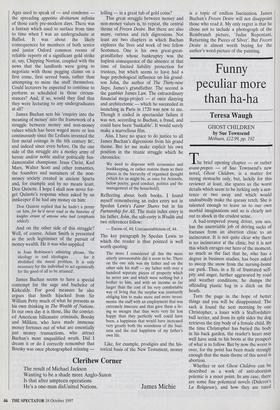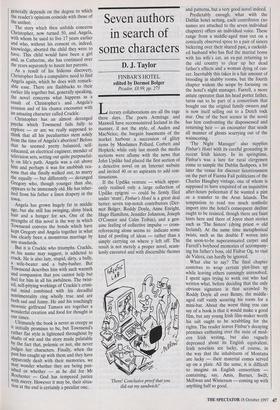Funny peculiar more than ha-ha
Teresa Waugh
GHOST CHILDREN by Sue Townsend Methuen, £12.99, pp. 192 he brief opening chapter — or rather avant-propos — of Sue Townsend's new novel, Ghost Children, is a matter for strong stomachs only, but, luckily for this reviewer at least, she spares us the worst details which seem to be lurking only a sen- tence or two away and which would undoubtedly make the queasy retch. She is talented enough to leave us to our own morbid imaginations and so is clearly not out to shock in the crudest sense.
A bad-tempered young driver, you see, has the unenviable job of driving sacks of foetuses from an abortion clinic to an incinerator. It is not quite clear why there is no incinerator at the clinic, but it is not this which enrages our hero of the moment, so much as the fact that he, who has a degree in business studies, has been asked to sweep the snow from the nursing-home car park. Thus, in a fit of frustrated self- pity and anger, further aggravated by road and weather conditions, he dumps the offending plastic bag in a ditch on the heath.
Turn the page in the hope of better things and you will be disappointed. The sack is found the next morning by one Christopher, a loner with a Staffordshire bull terrier, and from its split sides the dog retrieves the tiny body of a female child. By the time Christopher has buried the body in his back garden, the reader's heart may well have sunk to his boots at the prospect of what is to follow. But by now the worst is over, for the point has been made strongly enough that the main theme of this novel is abortion.
Whether or not Ghost Children can be described as a work of anti-abortion polemic is a moot point. In any case, there are some fine polemical novels (Diderot's La Religieuse), and how they are rated generally depends on the degree to which the reader's opinions coincide with those of the author.
The story which then unfolds concerns Christopher, now turned 50, and Angela, With whom he used to live 17 years earlier and who, without his consent or, indeed, knowledge, aborted the child they were to have. This child would have been a girl and, as Catherine, she has continued over the years separately to haunt her parents.
As a result of his hideous discovery, Christopher feels a compulsive need to find Angela again, which he does with remark- able ease. There are flashbacks to their earlier life together but, generally speaking, the novel concerns what happens as a result of Christopher's and Angela's reunion and of his chance encounter with an amazing character called Crackle. Christopher has an almost deranged psyche which Townsend fails fully to explore — or are we really supposed to think that all his peculiarities stem solely from the time of Angela's abortion? Before that he seemed pretty balanced, self- educated, an electrical engineer, mender of television sets, setting out quite purposeful- ly on life's path. Angela was a cut above him and perhaps it was for snobbish rea- sons that she finally walked out, to marry the equally — but differently — deranged Gregory who, though younger than she, appears to be immensely old. He has inher- ited from his father a linen drapery in the town.
Angela has grown hugely fat in middle age, but she still has swinging, shiny black hair and a hunger for sex. One of the strengths of this novel is the way in which Townsend conveys the bonds which have kept Gregory and Angela together in what has clearly been a monstrous marriage by any standards.
But it is Crackle who triumphs. Crackle, as his name may suggest, is addicted to crack. He is also lazy, stupid, dirty, a bully, a wife-beater and a baby-basher. But Townsend describes him with such warmth and compassion that you cannot help but feel for him in all his awfulness. The twist- ed, self-pitying workings of Crackle's crimi- nal mind combined with his dreadful sentimentality ring wholly true and are both sad and funny. He and his touchingly moronic girlfriend Tamara are together a wonderful creation and food for thought in our times.
• Ultimately the book is never as creepy as it Initially promises to be, but Townsend's rather flat style is lightened throughout by shafts of wit and the story made palatable b. y the fact that, polemic or not, she never Judges her characters. Finally, when the Past has caught up with them and they have apparently dealt with their memories, we may wonder whether they are being pun- ished or whether — as he did for Mr Rochester — God has tempered justice With mercy. However it may be, their situa- tion at the end is certainly a peculiar one.



























































































 Previous page
Previous page